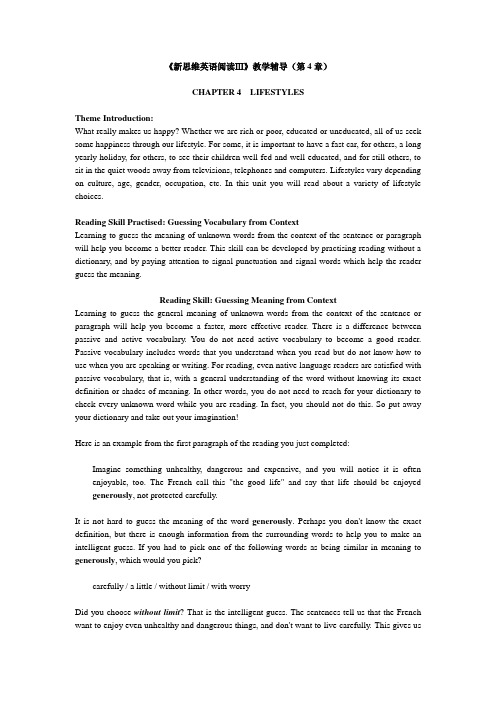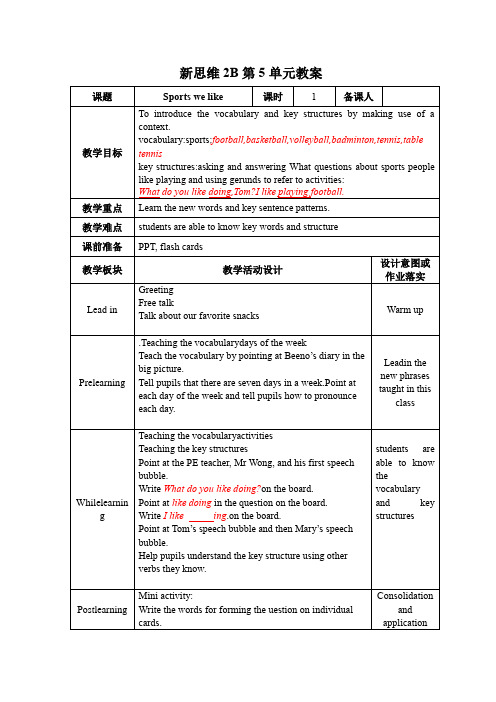《新思维英语阅读》教学辅导(第5章)
AChapter5Signswesee课件(新思维小学英语)

Do not walk on the grass.
Do not ride a bicycle.
Do not feed the animals.
Do not throw litter.
Rewrite the sentences with don’t or can’t.
Hale Waihona Puke 3You can’t walk on the grass.
_D_o_n_’t_w_a_l_k_o_n_t_h_e_g_r_a_ss_.__
4
Don’t climb the trees.
_Y_o_u_c_a_n’_t_c_li_m_b_t_h_e_t_r_e_e_s._
Can they eat the bananas?
What sign do the people see?
Are the monkeys hungry now?
Activity 1
hungry yummy
full
Answers
Activity 2
Activity 3
DO NOT THROW LITTER.
DO NOT CLIMB
THE TREES.
DO NOT PICK
THE FLOWERS.
DO NOT WALK ON THE GRASS.
Activity 4
Do you know these signs?
Do not pick the flowers.
Do not bring your
Rewrite the sentences with don’t or can’t.
1
You can’t pick the flowers. _D_o_n_’t_p_ic_k_t_h_e_f_lo_w_e_r_s.____
《新思维英语阅读Ⅲ》教学辅导(第4章)

《新思维英语阅读Ⅲ》教学辅导(第4章)CHAPTER 4 LIFESTYLESTheme Introduction:What really makes us happy? Whether we are rich or poor, educated or uneducated, all of us seek some happiness through our lifestyle. For some, it is important to have a fast car, for others, a long yearly holiday, for others, to see their children well-fed and well-educated, and for still others, to sit in the quiet woods away from televisions, telephones and computers. Lifestyles vary depending on culture, age, gender, occupation, etc. In this unit you will read about a variety of lifestyle choices.Reading Skill Practised: Guessing Vocabulary from ContextLearning to guess the meaning of unknown words from the context of the sentence or paragraph will help you become a better reader. This skill can be developed by practising reading without a dictionary, and by paying attention to signal punctuation and signal words which help the reader guess the meaning.Reading Skill: Guessing Meaning from ContextLearning to guess the general meaning of unknown words from the context of the sentence or paragraph will help you become a faster, more effective reader. There is a differenc e between passive and active vocabulary. Y ou do not need active vocabulary to become a good reader. Passive vocabulary includes words that you understand when you read but do not know how to use when you are speaking or writing. For reading, even native language readers are satisfied with passive vocabulary, that is, with a general understanding of the word without knowing its exact definition or shades of meaning. In other words, you do not need to reach for your dictionary to check every unknown word while you are reading. In fact, you should not do this. So put away your dictionary and take out your imagination!Here is an example from the first paragraph of the reading you just completed:Imagine something unhealthy, dangerous and expensive, and you will notice it is often enjoyable, too. The French call this "the good life" and say that life should be enjoyed generously, not protected carefully.It is not hard to guess the meaning of the word generously. Perhaps you don't know the exact definition, but there is enough information from the surrounding words to help you to make an intelligent guess. If you had to pick one of the following words as being similar in meaning to generously, which would you pick?carefully / a little / without limit / with worryDid you choose without limit? That is the intelligent guess. The sentences tell us that the French want to enjoy even unhealthy and dangerous things, and don't want to live carefully. This gives usthe impression of living freely, without limits, rather than being careful or worried.Sometimes, of course, it is necessary to know the exact dictionary definition of a word; for example, when you are using the word in your own speaking or writing, or if you are taking a vocabulary test on the TOEFL or TOEIC. But in the case of reading, checking every unknown word in the dictionary not only slows down your pace and makes you lose the general meaning of the paragraph, it also makes you less confident to use your intelligence and imagination. Of course dictionaries are useful and necessary, and sometimes there is best in this reading course to use your brain more than your dictionary!Practice:It is not always possible to get the exact meaning of the word from the context. But knowing the exact meaning of a word is not usually necessary to understanding the paragraph. Use the context of the sentence to determine the meaning of the underlined word. Then choose the word or phrase which best expresses the word's meaning.1. Much of the world, and the U.S. in particular, has gone on an "anti-fat" campaign.A. planned activities supporting a beliefB. campingC. holiday2. Heart attacks are about twice as likely to strike Americans as French.A. to pleaseB. to hitC. to change3. Y oung professional Americans are becoming more cautious about their alcohol intake, saying that it is safer, healthier to drink less wine and more orange juice.A. carefulB. carelessC. happy4. Drug companies are working on a pill that will reproduce the healthful chemical properties of wine.A. throw awayB. get rid ofC. create something similarIt is very simple! The keys should be: 1. A 2. B 3. A 4. CReading Skill: Contextual Paraphrasing by PunctuationThere are other ways of using context to guess the meaning of unknown words. Sometimes the writer will paraphrase (use other words) to make his meaning clearer for the reader. These paraphrases are often signalled by punctuation. The punctuation which signalparaphrases include:comma (,)double dash (—)set of parentheses ( )For example, in Reading One of this chapter, the following sentence is given in paragraph 2:They load up their shopping carts with fois gras (fatty goose liver), rich cheese, butter-soaked cakes and pastries.In this sentence the unknown French phrase fois gras is defined for you in a set parentheses, as. fatty goose liver. The unknown word is circled, and its definition is underlined.Practice:The following sentences use contextual paraphrasing by punctuation. Circle the words which are being defined. Then underline the definition.1. They are optimistic expecting the best in their future.2. Chinese entrepreneurs began accumulating gathering more money in the late 1990's.3. One reason for their discomfort is that they realize that the prosperity—wealth—that has created the group of newly-rich has not benefited all Chinese equally.4. Many workers have been laid off, losing their jobs temporarily for economic reasons, from state-run factories.Reading Skill: Contextual Paraphrasing by Signal WordsAnother way of using context to guess the meaning of unknown words is to notice when the writer uses signal words to indicate a paraphrase. To make his meaning clearer for the reader, sometimes the writer will signal a paraphrase of difficult words by the following signal words:i.e. - that isthat isin other wordsorFor example, in Reading One of this chapter, the following sentence is given in paragraph 2: (Hedonism), that is, believing that pleasure is the purpose of life, seems to bring health, not illness.In this sentence the meaning of the difficult word hedonism is signalled for you by the expression that is. After the signal words that is, the definition of the difficult word follows. In this example, the unknown word is circled, and its definition is underlinePracticeIn the following sentences, a paraphrase of difficult words is signalled by the signal words given above. Circle the words which are being defined. Then underline the definition.1. While most of the world seems to be motivated by more money, there are some independent souls who are tired of the rat-race, that is, the stressful pressures of working hard to get ahead.2. Each of these groups places a high priority on a sense of community, in other words, the feeling of belonging and mutual support.3. It is multi-generational, i.e. with ages ranging from children to seniors.4. These communities are the newest expression of the 300-year-old American desire to build a non-hierarchical, or equal, community with values uncorrupted by the larger society.Main Idea of Reading Materials:Reading One:本文通过对法国人生活方式地描述,指出:法国人心中“好生活”地概念是:一切顺其自然,无所顾忌,尽情享受的生活。
3B Chapter 5 Our bodies 课件(新思维小学英语)

What did Mum say to Bobby?
How tall was Bobby one year ago?
Could Bobby reach 132 cm one year later?
How tall was Rita?
How tall must children reach to go on the roller-coaster?
Did Dad look excited? How did he feel?
How tall was Bobby?
Could Bobby go on the roller-coaster alone?
Did Dad go on the roller-coaster with
Bobby?
Who went on the roller-coaster with
1. Sam _w_a_s__ (be) 128 cm last year. He ___is__ (be) 129 cm this year.
2. Sam and Ken _w_e_r_e___ (be) 25 kg last year. They _a_re___ (be) 28 kg this year.
Revision 1. Tom _w_a_s___ (be) 30 kg last year.
He __is____ (be) 33 kg this year.
2. Sam and Ken _sw_a_m___ (swim) yesterday.
3. Mary _s_t_u_di_e_d (study) last night.
1
Height
Last year
This year
6B Chapter 5 课件(新思维小学英语)

: I don’t have any favourite subjects. : My favourite subject is PE. : I can’t choose.
Wendy
: Can you tell me about your family?
Mrs Lam
: Certainly. I have two brothers. : Yes. : I live with my family.
SWoamseStiamllyesrewlahxeend aytofWuir’srhte?enHedorviwdoduSsoa,llyyyooruuelkcanaxno?’wt ?
remember what to say.
How did Sally feel after the interview?
Wendy
: What school activities do you like?
Mrs Lam
: No, I don’t like school activities. : I like drama and sports. : I like doing homework.
Wendy
: What do you want to be when you grow up?
Wendy
: I look forward to seeing you again, Wendy.
Mrs Lam
: Thank you. I look forward to seeing you again too.
: Oh really?
Wendy : You’re welcome.
Interview tips: - Relax - Be yourself - Have eye contact with
AChapter5Specialthings课件(新思维小学英语)

bracelet — metal, $219
A: Excuse me. What’s this bracelet made of? B: It’s made of metal. A: How much does it cost? B: It’s two hundred and nineteen dollars. A: I’ll take it.
What
is the vase are the chopsticks
made of?
It
is
made of
glass. wood.
They are
Buying things
does
the vase it
How much
do
the chopsticks they
cost?
It costs
five hundred two hundred and fifty
CaDnidyopueoimplaegin e usinagnctrieentbCrahnincahes toccleleaannthyeoiurrteteeethth??
Ancient football boots looked like sandals.
Do ancient football boots look like sandals?
Thank you !
Hale Waihona Puke statue — jade, $965
A: Excuse me. What’s this statue made of? B: It’s made of jade. A: How much does it cost? B: It’s nine hundred and sixty-five dollars. A: I’ll take it.
新思维2B第5单元教案

2
备课人
教学目标
To review the vocabulary and introduce key structቤተ መጻሕፍቲ ባይዱres by making use of a context.
key structures:
What do you like doing,Tom?I like playing football.
Tell pupils that there are seven days in a week.Point at each day of the week and tell pupils how to pronounce each day.
Leadin the new phrases taught in this class
Postlearning
Ask each pupilWhat do you like doing?
The pupil answers the question by sayingI like_
ing.(e.g.I like playing table tennis.)Then he/she es to the board and writes his her name in the
教学难点
develop pupils’ reading skills
locate specific information in response to question.
课前准备
PPT, flash cards
教学板块
教学活动设计
设计意图或作业落实
Lead in
Greeting
Free talk
Revision of the learned words and phrases.
新思维大学英语4 第五单元

Psychotherapy of the American analytical type(美 国分析式心理治疗法) is not now recommended for phobias-it is no good dredging the murky well of memories to explore what it was that grandma said at age of 3 or what you did behind the bushes aged 7.
6
◆短语解析:be recommended for sth/doing sth. ◆句型扩展:It is (no) good /use /fun doing sth. ◆eg :①覆水难收。 ◆It is no use crying over spilt milk. ◆②周末与朋友一起去野营很有趣。 ◆It is great fun camping at weekends with our friends.
3
Cognitive therapy also helps (心理治疗法). An understanding (of their own personality) and an appreciation (of its strengths and abilities as well as the knowledge )that they exaggerate their perceived disadvantages paradoxically makes them less self-absorbed.
2
◆ 短语解析: ◆ ①rather than:而不是;宁可…也不愿;不是…而是…;与其说… 不如说…;胜于 ◆ rather die than recant 宁死不改变信仰 ◆ Rather Use than Fame 实重于名 ◆ eg:该做这工作的是我,而不是你。 ◆ I, rather than you, should do the work. ◆ ②seek out:找出;搜出;想获得 ◆ seek sb out 追求某人 ◆ I'll seek you out 我要找到你 ◆ eg:我们试图找出机器的故障。 ◆ We are trying to seek out the trouble of the machine. ◆ ③no more than:adv. 不过,仅仅;同…一样不,和…同样不;, 只是 ◆ eg:他只不过是一个普通的语文老师。 ◆ He is no more than an ordinary Chinese teacher.
4A Chapter 5 Animals big and small 课件(新思维小学英语)

THANK YOU!
bigger fatter fitter
Practice
e.g. noisy
1 hot
2 fit
3 long
4 strong
5 pretty
6 wise
7 heavBiblioteka 8 largenoisier
hotter fitter longer stronger prettier wiser heavier larger
The elephant
the biggest animal in the jungle.
The shark
is the largest fish
in the sea.
The giraffe
the tallest animal in the world.
the superlative (adjective + est) noun
Practice
elephant
large small
bird
The elephant is larger than the bird. The bird is smaller than the elephant.
Superlatives
Comparison of a quality among three or more people / things
新思维小学英语
Chapter Five
Animals big and small
4A
By Nancy
New Words
a horse
- 1、下载文档前请自行甄别文档内容的完整性,平台不提供额外的编辑、内容补充、找答案等附加服务。
- 2、"仅部分预览"的文档,不可在线预览部分如存在完整性等问题,可反馈申请退款(可完整预览的文档不适用该条件!)。
- 3、如文档侵犯您的权益,请联系客服反馈,我们会尽快为您处理(人工客服工作时间:9:00-18:30)。
《新思维英语阅读》教学辅导(第5章)《新思维英语阅读Ⅲ》教学辅导(第5章)CHAPTER 5 AGINGTheme Introduction:The search for the secret to long life has existed since time began. We all want a long, healthy life. We notice the signs of our own aging with concern. Why do we age? While medical science, and individuals consider ways to prolong human lifespan, the numbers of people over 60 — and particularly those over 80 — are growing fast. This rapid aging of global society brings many problems.Reading Skill Practised: Word AnalysisAs you learned in Chapter 4, learning to read without constant use of your dictionary will help you become a faster and more efficient reader. However, sometimes the context of the sentence does not give enough information for you to guess the meaning of unknown words. Another vocabulary strategy you can try is word analysis. In word analysis, the reader breaks down English words into common parts and guesses the meaning from the word origin.Reading Skill: Word Analysis (Prefixes)Sometimes the context of the sentence does not give enough information for you to guess the meaning of the unknown word. If that is the case, and you feel you need to know that unknown word's meaning to understand the sentence, then you should open your dictionary. However, there is another vocabulary strategy you might try: Word analysis. In word analysis, the reader breaks down English words into prefix (the beginning of the word), root (the middle of the word, and its basic meaning), and suffix(the end of the word). An example is the word international, which canbe broken down like this:Prefix Root Suffix inter nation al(between) (nat = to be born. Nation means literally\ (about, away of being)a group of people born together\and has come to mean a country.)International is about the relations or exchanges between two or morecountriesYou can use this strategy of word analysis to guess the meaning of theword. Especially if there is some contextual information in the sentenceor paragraph, word analysis can be quite useful.Here is a partial list of common prefixes.Prefix Meaning Example ad-, af- move towards advance anti- against anti-agingauto- self automobile bi- two biannual con-, corn-, co- with conversation en- to giveenlighten de- away from, down decreasehyper- over hyperactive inter-,intra- between, among, within international mini- small minibus maxi- large maximum mis- wronglymisunderstand mono- onemonologue poly- manypolytechnic pre- beforepreview pro- forwards, forth promotesub- under substandard super- above supernatural tele- far telephone trans- acrosstranslateultra- extremeultraconservativeun-, in-, im- negative, not unhelpful,impolite, illegalReading Skill: Word Analysis (Roots)Roots carry the basic meaning of the word. The meaning of the roots canbe changed by adding prefixes or suffixes. Here is a partial list of commonroots. Root Meaning Example aud hear auditorium bio life biosphere diet speak, word predictduct to lead conduct ferto bring, carry transfer firm to makestrong confirm gen(e) to create, make generate homo the same homogeneoushetero different heterosexualhydro water hydro-electric ject to throw objectlogy the study of psychology man hand manual mar sea marine mov, mot, mob to move motivate mort dead mortal port to carry portable psych mental, brainpsychologist serv to protect, to keepservantspect to look at spectatorstruct to build construct vis,vid to see, sight videoReading Skill: Word Analysis SuffixBy adding a suffix after the root, we can change the meaning of the word.Here is a partial list of common suffixes. Also added is the word form:adjective (adj): noun (n); adverb (adv).Suffix Meaning Example -ar of, for popular -able.-ible (adj)ability to lovable -er, -or, -ist (n) aperson who biologist-er, -est (adj) more, most shorter,shortest -ful (adj) full ofbeautiful -hood (n) state of beingmotherhood -ic, -al (adj) made of, about,internationalway of being-ious (adj) full of curious -ish(adj) like, similar to childish -ity (n) state of being dignity -ive (adj)causing, making active -ly (adv) in themanner of quietly -less (adj) without worthless -ness (n) state of beingkindness -some (adj) full of, causingtiresomeMain Idea of Reading Materials:Reading One:本文首先指出:人口老龄化问题已成为全世界面临的第一大问题,中国社会也同样面临老龄化危机的挑战;接着分析了老龄化危机的原因,随之在一系列解决方法中提出关怀老年人的一些措施。
Reading Two:本文从生理及社会的角度分析人衰老的原因。
Reading Three:本文由老寿星就如何活到120岁为话题谈长寿的经验并指出:基因遗传、生活方式及生活态度对人寿命的影响甚大。
